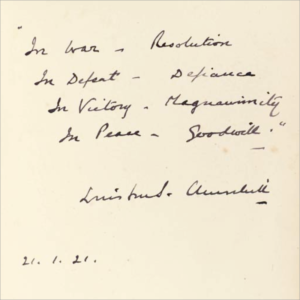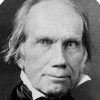There is no such thing as a moral dress. It’s people who are moral or immoral.
If you’re going through hell, keep going.
Winston Churchill (1874-1965) British statesman and author
(Spurious)
Also sometimes given as "If you're going through hell, don't stop." Not found in any of Churchill's written works or directly attributed to him in any reliable source. See here for more information.
The inherent vice of capitalism is the unequal sharing of blessings. The inherent virtue of socialism is the equal sharing of miseries.
Winston Churchill (1874-1965) British statesman and author
Speech, House of Commons (22 Oct 1945)
(Source)
I am prepared to meet my Maker. Whether my Maker is prepared for the great ordeal of meeting me is another matter.
WOMAN: There are two things I don’t like about you, Mr. Churchill — your politics and your mustache.
CHURCHILL: My dear madam, pray do not disturb yourself. You are not likely to come into contact with either.
It is vain to imagine that the mere perception or declaration of right principles, whether in one country or in many countries, will be of any value unless they are supported by those qualities of civic virtue and manly courage
In War: Resolution.
In Defeat: Defiance.
In Victory: Magnanimity.
In Peace: Goodwill.Winston Churchill (1874-1965) British statesman and author
The Second World War, Vol. 1: The Gathering Storm, Epigram, “Moral of the Work,” (1948)
(Source)
The most famous use of the quote, though it can be found as far back as 21 Jan 1921 in Churchill's own hand, and Edward Marsh, his private secretary, suggested it dated back to just after WW I, as a possible war memorial.
More information here: CHURCHILL, Sir Winston Spencer (1874-1965). Autograph sentiment signed and dated, 21 January 1921, 'In War - Resolution , In Defeat - Defiance , In Victory - Magnanimity , In Peace - Goodwill', one page, 4°, in a commonplace book further inscribed and signed 'To Nell from Winston S. Churchill 21.1.21', and with one other inscription, contemporary marbled calf, front cover panelled in gilt and blind. Provenance: Roy A. Dalton; and by descent..
But it’s no show just to protect the serious, the solemn, and the high-minded. We must protect the flippant, the zany, the heretical, and the downright queer. The Constitution gives every American the inalienable right to make a damn fool of himself.
Every evil in the bud is easily crushed: as it grows older, it becomes stronger.
[Omne malum nascens facile opprimitur; inveteratum fit pleurumque robustius.]
Marcus Tullius Cicero (106-43 BC) Roman orator, statesman, philosopher
Philippicae [Philippics], No. 5, ch. 11 / sec. 28 (5.28) (1 Jan AD 43)
(Source)
(Source (Latin)). Alternate translations:
Every evil is easily crushed at its birth; when it has become of long standing, it usually gets stronger.
[tr. Yonge (1903)]
Every evil is easily crushed at its birth; become inveterate it as a rule gathers strength.
[tr. Ker (1926)]
What is so advantageous to the people as liberty? which is sought out and preferred to everything, not only by men, but even by the beasts.
[Quid tam populare quam libertas? Quam non solum ab hominibus verum etiam a bestiis expeti atque omnibus rebus anteponi videtis.]
Marcus Tullius Cicero (106-43 BC) Roman orator, statesman, philosopher
De Lege Agraria [On the Agrarian Law], Oration 2 “Contra Rullum,” sec. 9 (63 BC) [tr. Yonge (1856)]
(Source)
(Source (Latin)). Alternate translation:
What is so beneficial to the people as liberty, which we see not only to be greedily sought after by men, but also by beasts, and to be preferred to all things.
[Source (1884)]
If you pursue good with labor, the labor passes away but the good remains. If you pursue evil with pleasure, the pleasure passes away and the evil remains.
Marcus Tullius Cicero (106-43 BC) Roman orator, statesman, philosopher
(Attributed)
Widely attributed to Cicero, but no actual citations found. Sometimes the clauses are reversed:
If you pursue evil with pleasure, the pleasure passes away and the evil remains. If you pursue good with labor, the labor passes away but the good remains.
For it is the part of a wise man to resolve beforehand that whatever can happen to a brave man is to be endured with patience if it should happen. It is indeed a proof of altogether greater wisdom to act with such foresight as to prevent any such thing from happening; but it is a token of no less courage to bear it bravely if it should befall one.
[Est enim sapientis, quidquid homini accidere possit, id praemeditari ferendum modice esse, si evenerit. Majoris omnino est consilii providere ne quid tale accidat, animi non minoris fortiter ferre si evenerit.]
Marcus Tullius Cicero (106-43 BC) Roman orator, statesman, philosopher
Philippics, No. 11, ch. 3 / sec. 7 (11.7) (late Feb AD 43) [tr. Yonge (1903)]
(Source)
(Source (Latin)). Alternate translations:
For it is the part of a wise man to resolve beforehand that whatever can happen to a man should be borne calmly if it should befall him. It needs altogether great judgment to provide against such evil happening and no less courage to bear it with fortitude if it should befall.
[tr. Ker (1926)]
It is the mark of a wise man ever to consider, reflect, that whatever may happen to him should be borne with patience. It is, however, a mark of greater wisdom to take every precaution against the occurrence of any thing unpleasant, of a reverse of fortune; but it is an indication of a mind in no wise inferior bravely and manfully to submit to any change of fortune, however unpleasant, untoward, unfavorable, unpropitious.
[Source]
This appears to the the source of the paraphrase: "To yield to occasion is the mark of a wise man."
The safety of the people is the supreme law.
[Salus populi suprema lex esto.]
Marcus Tullius Cicero (106-43 BC) Roman orator, statesman, philosopher
De Legibus [On the Laws], Book 3, ch. 3 / sec. 8 (3.3/3.8) [Marcus] (c. 51 BC) [tr. Barham (1842)]
(Source)
Cicero gives this in his outline of how government ought to be constituted, in particular how the consuls should have ultimate authority over the law and the army. (Source (Latin)). Alternate translations:
The safety of the people shall be their highest law.
[tr. Keyes (1928)]
The safety of the people shall be the highest law.
[tr. Rudd (1998)]
For them let the safety of the people be the highest law.
[tr. Zetzel (1999)]
Let the safety of the people be the highest law.
[tr. Fott (2013)]
Other, more general translations:The phrase (in Latin) was used frequently during the Enlightenment as a core statement around the purpose of government, most famously in John Locke's Second Treatise,, ch. 13, sec. 158.
- "The good of the people is the chief law."
- "Let the welfare of the people be the ultimate law."
More information about this quote and its uses: Salus populi suprema lex esto - Wikipedia
A room without books is like a body without a soul.
Marcus Tullius Cicero (106-43 BC) Roman orator, statesman, philosopher
(Paraphrase)
(Source)
This appears to be a paraphrase of:
Since Tyrannio has arranged my books, the house seems to have acquired a soul.
[Postea vero quam Tyrannio mini libros disposuit, mens addita videtur meis aedibus.]
From Epistulae ad Atticum [Letters to Atticus], Book 4, Letter 8 (4.8) (Apr-May 56 BC) [tr. Winstedt (1912)].
The national budget must be balanced. The public debt must be reduced; the arrogance of the authorities must be moderated and controlled. Payments to foreign governments must be reduced, if the nation doesn’t want to go bankrupt. People must again learn to work, instead of living on public assistance.
Marcus Tullius Cicero (106-43 BC) Roman orator, statesman, philosopher
(Spurious)
(Source)
One of several related paraphrases of this "quote" from Taylor Caldwell's novel about Cicero, A Pillar of Iron, ch. 51 (1965):
Antonius heartily agreed with him [sc. Cicero] that the budget should be balanced, that the Treasury should be refilled, that public debt should be reduced, that the arrogance of the generals should be tempered and controlled, that assistance to foreign lands should be curtailed lest Rome become bankrupt, that the mobs should be forced to work and not depend on government for subsistence, and that prudence and frugality should be put into practice as soon as possible.
See here and here for more discussion.
Peace indeed is both sweet in name and wholesome in reality; but there is all the difference in the world between peace and slavery. Peace is the calmness of freedom, slavery the worst of all evils, to be kept off at a the cost not only of war, but even of life itself.
[Et nomen pacis dulce est et ipsa res salutaris; sed inter pacem et servitutem plurimum interest. Pax est tranquilla libertas, servitus postremum malorum omnium, non modo bello sed morte etiam repellendum.]
Marcus Tullius Cicero (106-43 BC) Roman orator, statesman, philosopher
Philippicae [Philippics], No. 2, ch. 44 / sec. 113 (2.113) (24 October AD 44) [tr. King (1867)]
(Source)
(Source (Latin)). Alternate translations:
The name of peace is sweet, the thing itself is most salutary. But between peace and slavery there is a wide difference. Peace is liberty in tranquillity; slavery is the worst of all evils, -- to be repelled, if need be, not only by war, but even by death. [tr. Yonge (1903)]
And the name of peace is sweet, and the thing itself wholesome, but between peace and servitude the difference is great. Peace is tranquil liberty, servitude the last of all evils, one to be repelled, not only by war but even by death.
[tr. Ker (1926)]
The name of peace is sweet, and the thing itself is beneficial, but there is a great difference between peace and servitude. Peace is freedom in tranquility, servitude is the worst of all evils, to be resisted not only by war, but even by death.
Each man must use his own judgement.
[Suo cuique iudicio est utendum.]
Marcus Tullius Cicero (106-43 BC) Roman orator, statesman, philosopher
De Natura Deorum, Book 3, ch. 1 [tr. Rackham (1933)]
(Source)
Somehow or other no statement is too absurd for some philosophers to make.
[Sed nescio quo modo nihil tam absurde dici potest quod non dicatur ab aliquo philosophorum.]
Marcus Tullius Cicero (106-43 BC) Roman orator, statesman, philosopher
De Divinatione [On Divination], Book 2, ch. 58 (2.58) / sec. 119 (45 BC) [tr. Falconer (1923)]
(Source)
Everybody knows that the first law of history is not daring to say anything false; that the second is daring to say everything that is true; that there should be no suggestion of partiality, none of animosity when you write.
[Nam quis nescit primam esse historiae legem, ne quid falsi dicere audeat? Deinde ne quid veri non audeat? Ne quae suspicio gratiae sit in scribendo? Ne quae simultatis?]
Marcus Tullius Cicero (106-43 BC) Roman orator, statesman, philosopher
De Oratore [On the Orator, On Oratory], Book 2, ch. 15 (2.15) / sec. 62 (55 BC) [tr. May/Wisse (2001)]
(Source)
(Source (Latin)). Alternate translations:
For, is there a Man ignorant, that the first Rule of History is, that an Historian shall not dare to advance a Falsity; the next, that there is no Truth but what he shall dare to tell? That in Writing, he shall be free of all Prepossession; of all Pique?
[tr. Guthrie (1755)]
For, is there a man ignorant that the first rule of history is that an historian shall not dare to advance a falsehood; the next, that there no truth but what he shall dare to tell? That the writer should be actuated neither by favour, or by prejudice?
[Source (1808)]
For who is ignorant that it is the first law in writing history, that the historian must not dare to tell any falsehood, and the next, that he must be bold enough to tell the whole truth? Also, that there must be no suspicion of partiality in his writings, or of personal animosity?
[tr. Watson (1860)]
Who need be informed that the first law of history is, to have the honesty to state no falsehood, the next, the courage to suppress no truth, and to avoid all suspicion of undue bias or personal animosity?
[tr. Calvert (1870)]
Who does not recognise that the first law of history is that we shall never dare to say what is false; the second that we shall never fear to say what is true; that everything we write shall be free from any suspicion of favoritism or flattery?
[ed. Harbottle (1906)]
For who does not know history's first law to be that an author must not dare to tell anything but the truth ? And its second that he must make bold to tell the whole truth? That there must be no suggestion of partiality anywhere in his writings? Nor of malice?
[tr. Sutton/Rackham (1940)]
The first law for the historian is that he shall never dare utter an untruth. The second is that he shall suppress nothing that is true. Moreover, there shall be no suspicion of partiality in his writing, or of malice.
[Bartlett's]
Thus in all things the greatest pleasures are only narrowly separated from disgust.
[Sic omnibus in rebus, voluptatibus maximis fastidium finitimum est.]
Marcus Tullius Cicero (106-43 BC) Roman orator, statesman, philosopher
De Oratore [On the Orator, On Oratory], Book 3, ch. 25 (3.25) / sec. 100 (55 BC) [tr. Rackham (1942)]
(Source)
(Source (Latin)). Alternate translations:
Thus, generally speaking, Loathing borders upon the most pleasing Sensations.
[tr. Guthrie (1755)]
Thus, generally speaking, satiety borders upon the most pleasing sensations.
[Source (1808)]
In all other things, loathing still borders upon the most exquisite delights.
[tr. Watson (1860)]
The extremes of gratification and disgust are separated by the finest line of demarcation.
[tr. Calvert (1870)]
In everything we do, all our keenest pleasures end in satiety.
[ed. Harbottle (1906)]
In everything else, then, the greatest pleasure borders on aversion.
[tr. May/Wisse (2001)]
Among Christians so much prominence has been given to the disciplinary effects of sorrow, affliction, bereavement, that they have been in danger of overlooking the other and more obvious side: that by every joy, by every favor, by every sign of prosperity
Francis Edward Clark (1851-1927) American clergyman
(Attributed)
For he that makes any thing his chiefest good, wherein justice or virtue does not bear a part, and sets up profit, not honesty, for the measure of his happiness; as long as he acts in conformity with his own principles, and is not overruled by the mere dictates of reason and humanity, can never do the offices of friendship, justice, or liberality: nor can he ever be a man of courage, who thinks that pain is the greatest evil; or he of temperance, who imagines pleasure to be the sovereign good.
[Nam qui summum bonum sic instituit, ut nihil habeat cum virtute coniunctum, idque suis commodis, non honestate metitur, hic, si sibi ipse consentiat et non interdum naturae bonitate vincatur neque amicitiam colere possit nec iustitiam nec liberalitatem; fortis vero dolorem summum malum iudicans aut temperans voluptatem summum bonum statuens esse certe nullo modo potest.]
Marcus Tullius Cicero (106-43 BC) Roman orator, statesman, philosopher
De Officiis [On Duties; On Moral Duty; The Offices], Book 1, ch. 2 (1.2) / sec. 5 (44 BC) [tr. Cockman (1699)]
(Source)
Attacking the Epicurean "highest good" of avoiding pain and seeking personal detachment; Cicero supported the Stoic virtues of courage and moderation.
(Source (Latin)). Alternate translations:
He who teaches that to be the chief good which hath no connection with virtue, which is measured by personal advantage, and not by honor; if he be consistent with himself, and not sometimes overcome by the benignity of nature, can neither cultivate friendship nor practice justice nor liberality. That man cannot be brave who believes pain the greatest evil; nor temperate, who believes pleasure the supreme good.
[tr. McCartney (1798)]
For if a man should lay down as the chief good, that which has no connexion with virtue, and measure it by his own interests, and not according to its moral merit; if such a man shall act consistently with his own principles, and is not sometimes influenced by the good ness of his heart, he can cultivate neither friendship, justice, nor generosity. In truth, it is impossible for the man to be brave who shall pronounce pain to be the greatest evil, or temperate who shall propose pleasure as the highest good.
[tr. Edmonds (1865)]
For he who so interprets the supreme good as to disjoin it from virtue, and measures it by his own convenience, and not by the standard of right, -- he, I say, if he be consistent with himself, and be not sometimes overcome by natural goodness, can cultivate neither friendship, nor justice, nor generosity; nor can he possibly be brave while he esteems pain as the greatest of evils, or temperate while he regards pleasure as the supreme good.
[tr. Peabody (1883)]
He who severs the highest good from virtue and measures it by interest and not by honour, if he were true to his principles and did not at times yield to his better nature, could not cultivate friendship, justice or liberality; and no one can be brave who declares pain the greatest evil, or temperate who maintains pleasure to be the highest good.
[tr. Gardiner (1899)]
For he who posits the supreme good as having no connection with virtue and measures it not by a moral standard but by his own interests -- if he should be consistent and not rather at times over-ruled by his better nature, he could value neither friendship nor justice nor generosity; and brave he surely cannot possibly be that counts pain the supreme evil, nor temperate he that holds pleasure to be the supreme good.
[tr. Miller (1913)]
Take, for example, the man who has established the kind of highest good that has nothing to do with virtue, that is, measured by the individual's convenience, not by his morality. If that man is consistent and is not in the meantime overcome by natural goodness, he cannot cultivate friendship, or justice, or openness of character. In fact, a man of courage who considers pain the greatest evil, or a temperate man who declares indulgence to be the greatest good, is surely an impossible contradiction.
[tr. Edinger (1974)]
No man can be brave who thinks pain the greatest evil; nor temperate, who considers pleasure the highest good.
[Source]
We find comfort among those who agree with us — growth among those who don’t.
Frank A. Clark (1911-1991) American writer
(Attributed)
When a distinguished but elderly scientist states that something is possible, he is almost certainly right. When he states that something is impossible, he is very probably wrong.
The thing about change is that it’s not permanent.
Tracy Clavin (contemp.) American educator
(Attributed)
The dumber people think you are, the more surprised they’re going to be when you kill them.
William Clayton (contemp.)
(Attributed)








